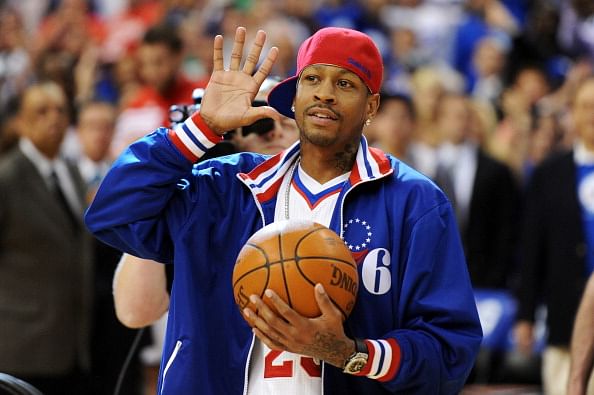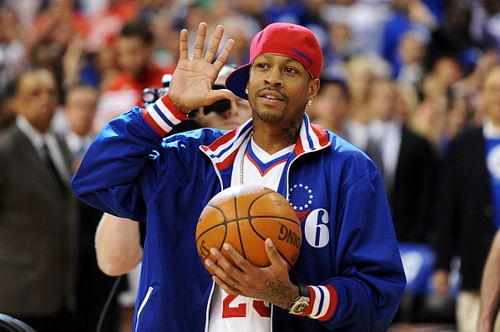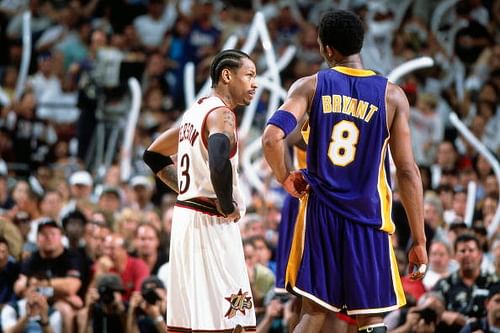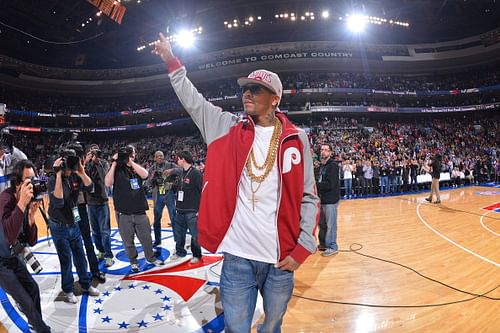
Questions, and the Answer: On the retirement of Allen Iverson

Former Philadelphia 76ers player Allen Iverson walks onto the court before Game Six of the Eastern Conference semis against the Boston Celtics in the 2012 NBA Playoffs. Iverson officially called time on his career last week. (Getty Images)
It’s June 2001, the Los Angeles Lakers are the reigning champions of the NBA and feature a team that would eventually go down as one of the most dominant basketball squads of all-time.
They have a 7’1” giant in Shaquille O’Neal in the prime of his powers and the heir apparent to Michael Jordan – a young Kobe Bryant – who has developed into one of the finest shooting guards in the game.
Coached by the legendary “Zen Master” Phil Jackson, the Lakers stormed into the NBA Finals by winning the last eight games of the season and winning the first three rounds of the playoffs; an unprecedented and undefeated run.
But on that summer night at the Staples Center, David brought down Goliath.

Allen Iverson #3 of the Philadelphia 76ers matches up against Kobe Bryant #8 of the Los Angeles Lakers during game five of the 2001 NBA Finals. (Getty Images)
Facing the Lakers in the Finals were the Philadelphia 76ers, a rag-tag bunch of below-average talents, who were carried almost-singlehandedly by a 6-foot-nothing superstar by the name of Allen Iverson.
Surviving insurmountable odds, outscoring superstar rivals, and playing through a slew of injuries, Iverson was in the midst of the most magical season of his career. And in that first game of the Finals in Los Angeles, he exploded.
A day before his 26th birthday, Iverson scored 48 points – including seven in Overtime – to lead the 76ers to a shock Game 1 victory. He fearlessly attacked the 7-footed O’Neal, cold-bloodedly outclassed his rival guard Bryant, and had an answer for every scheme set out by the invincible Lakers. He immortalised Tyrone Lue in the worst way possible.
The Lakers won the next four games and the NBA title, but Iverson’s performance became the signature moment from the 2001 Finals.
Thousands of miles away in India, I switched the TV off excitedly after Game 1, bounced the basketball out to the nearest court, and, all by myself, tried to recreate the moments that I had just watched.
I crossover-ed invisible defenders, shot over imaginary stretched hands, imagined that I was Iverson and pretended that there were 7-footed Shaqs blocking my way. And just like Iverson had just done, I led my team to an unlikely, underdog victory.
I dream of the chance of one day seeing the most exciting player of our time play live before my very eyes, unfiltered by the TV screen or continental distances.

Iverson is introduced on court before the game between the Charlotte Bobcats and the Philadelphia 76ers at the Wells Fargo Center on March 30, 2013 in Philadelphia, Pennsylvania. (Getty Images)
It’s October 2012, and that dream is finally realised. Now 37, – Iverson is wearing a jersey with Chinese characters spelling out the words ‘American Celebrities’. The occasion is far away from the day of his prime, the days when he played in NBA Finals games against Shaq and Kobe and where every shot added to the building blocks of his growing legacy.
This occasion is a meaningless exhibition game in Beijing, China, between the then-reigning Chinese Basketball Association champions the Beijing Ducks and a team consisting of some former American NBA players; some of them famous, some not so much. Jason Williams is there, so is Damon Jones and JR Reid. The Ducks feature former NBA All-Star (and China’s most-popular foreign player) Stephon Marbury.
But all the eyeballs are on Iverson.
Unfortunately, Iverson is a shell of his former self. Years away from his previous NBA appearance, away from his stint in Turkey, Iverson was looking to make an impression on the life-long fans who wanted to catch a glimpse of him, and even perhaps showcase his talents to interested Chinese teams. He manages to do neither. He rarely shoots, rarely attacks the basket, rarely brushes past the inferior defenders in front of him, rarely scores, and rarely creates.
David wasn’t beating Goliath anymore; as a matter of fact, David couldn’t even beat other Davids.
In his prime, Iverson was the ultimate dual personality of the sports world. On the court, he was unstoppable. He became the shortest player to be drafted number top in the NBA Draft. Through the course of a fantastic career, mostly with the 76ers, Iverson collected an MVP award (in the memorable 2001 season), a rookie of the year award, was an All-Star 11 times, led the league in scoring four times, and came within three wins of an NBA Championship.